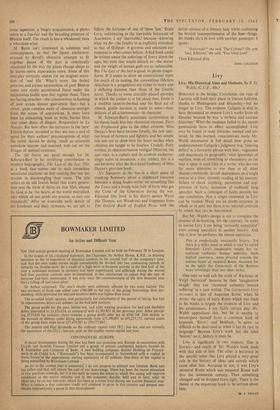Li vy
HORATIUS at the bridge, Coriolanus. the rape of Lucretia still hold their place in literate folklore, thanks to Shakespeare and Macaulay—but no longer to Livy. The emperor Caligula is said to have threatened to remove Livy's works from all libraries because he was 'a verbose and careless historian.' What the madman failed to do, recent generations have in effect accomplished. Livy may be found in most libraries. unread and un- loved. In this learned, conscientious study Mr. Walsh documents in full detail how gross an understatement Caligula's judgment was. 'Glaring defect' is a favourite phrase with him : vagueness and inaccuracy in geography: total ignorance of warfare, even of something so elementary as the way a spear is used (this in a writer who devotes far more attention to war than to all other themes combined); slavish dependence on a single source at a time; slovenly reading of his sources; failure to check anything: perversion and sup- pression of facts; invention of endlessly long speeches. Such a catalogue of faults permits but one conclusion. Not a single statement in Livy can be trusted. Many are no doubt accurate, in whole or in part, but there is no internal criterion by which that can be determined.
But Mr. Walsh's design is not to complete the process of de-bunking. On the contrary. he seeks to rescue Livy from being 'curiously unpopular' even among specialists in ancient history. And this is how he performs his rescue operation :
This is emphatically unscientific history. Yet there is a wider sense in which it may be called historical. Livy's imaginative insight has re- captured authentic human suffering. Such explicit awareness, when directed towards the various facets of ancestral Rome, recreates for us the spirit, the Geisteswelt of the Romans more revealingly than any other writer, One may as well call the work of fEschylus or Virgil 'historical' because by their 'imaginative insight' they too 'recreated authentic human suffering' in a past setting. The GeisteAwelt Livy recreates is that of Augustan Rome, when he wrote; the spirit of early Rome which one finds in his books is largely the creation of Livy and his predecessors. I am fairly certain that Mr. Walsh appreciates this, but he is unable to emancipate himself from a common kind of hypnosis. 'Error,' said Bentham, 'is never so difficult to be destroyed as when it has its root in language.' Because Livy's work has the label 'history' on it, history it must be.
Livy is significant in two respects. One is literary—and much of Mr. Walsh's book deals with that side of him. The other is historical in the specific sense that Livy played a very great role in the history of ideas and morals which came after him. Accurate or not, it was Livy's ancestral Rome which was ancestral Rome well into the nineteenth century. Then something changed and he dropped from sight. There is the theme of the important book to be written about him.










































 Previous page
Previous page